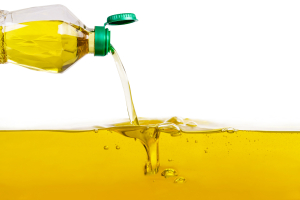Vegetable oils and why they should be avoided
The term vegetable oil is misleading as individuals have different perception of these type of oils. Vegetable oils include the following:
· Corn
· Soybean
· Canola
· Sunflower
· Peanut
· Cottonseed
· Safflower
Olive/extra virgin olive oil, avocado and coconut oil these are all fruit oils and are not considered vegetable oils
One of the main features about vegetable oils is that they are rich in Omeg-6 polyunsaturated acids. Although small amounts of omega-6 are essential for health, the problem is that the Western diet consumes far too much Omega-6. As the Western diet is also deficient in Omega-3 the outcome is an unbalanced ratio of Omega-6 to Omega3 fatty acids. Over the long term this can lead to a formation of a wide range of diseases such as cancer (Perumalla Venkata & Subramanyam, 2016; Wu et al., 2004), heart diseases (DiNicolantonio & O’Keefe, 2018) and diabetes (Okuyama et al., 2016). An optimal omega-6 to omega-3 ratio is 2:1 or even better 1:1. Modern world diet has dramatically shifted this ratio 15:1 up to 50:1 (Kiecolt-Glaser et al., 2013; Simopoulos, 2002).
These oils are more commonly referred to as industrial oils as they require an industrial process to make them, extracting oil from seed results in a very low yield. Producing these oils requires the use of chemical solvents. Firstly, a solvent such as hexane a volatile hydrocarbon is used to extract the oil from the seed. The oils are then hydrogenated at a high temperature in the presence of a catalyst. In the final steps the oils are deodorized.
Vegetable Oils and heart diseases. What is the link?
Since the banning of saturated fat in the 1970s as it raises cholesterol levels in the blood and high blood cholesterol causes coronary heart diseases, authorities have persuaded people to replace vegetable oils with saturated fats, in the hope to reduce the incidence of heart diseases.
The Sydney Diet Heat Study a randomized controlled trial (RCT) was designed to assess the effectiveness of omega 6 fats in reducing coronary heart diseases compared to saturated fat. The results showed that the intervention group who consumed Omega-6s had higher overall death rates from the controls and also had higher death rate of cardiovascular diseases (Ramsden et al., 2013). A second RCT showed that although the individuals who consumed vegetable oils, the polyunsaturated fats did indeed lower serum cholesterol, a 30 mg/dL drop of cholesterol was associated with a 22% increased risk of death (Ramsden et al., 2016).
Vegetable oils and cancer risk. What is the evidence?
Animal studies have shown that when mice and rats are fed corn oil they develop cancer. One study stated that mice fed a diet high in corn oil developed colon cancer, as the p53 tumour suppressor gene was suppressed (Wu et al., 2004).
Vegetable oils and liver diseases:
Non-alcoholic fatty liver disease (NAFLD), strongly associated with both obesity and insulin resistance, is on the rise. Currently there is no approved pharmacological treatment for NAFLD. A couple of studies have shown that increasing omega 6 consumption can speed up the rate of developing NAFLD (ARAYA et al., 2004; Patterson, Wall, Fitzgerald, Ross, & Stanton, 2012).
Conclusion:
One of the main reasons why these oils are bad for our heath is that as they have many double bonds, under cooking temperatures they are prone to get oxidized and generate lipid peroxides (Prabhu, 2000; Tańska, Roszkowska, Skrajda, & Dąbrowski, 2016).
Most of these omega-6 oils come from processed food such as salad dressings and various confectionery items such as crips, pastries etc. Therefore, naturally avoiding all these foods and eating whole and unprocessed foods will help to correct the omega 6 to omega 3 ratios. For cooking use olive oil and even butter. For dressing salads use extra-virgin olive oil, one of the main staples of the Mediterranean diet and avoid salad dressings at all costs.
Written by: Federico Bernuzzi: BSc in Biochemistry, MSc in Epidemiology and Biostatistics, 2nd Year PhD in Molecular Nutrition at the Quadram Institute
References:
ARAYA, J., RODRIGO, R., VIDELA, L. A., THIELEMANN, L., ORELLANA, M., PETTINELLI, P., & PONIACHIK, J. (2004). Increase in long-chain polyunsaturated fatty acid n−6/n−3 ratio in relation to hepatic steatosis in patients with non-alcoholic fatty liver disease. Clinical Science, 106(6), 635 LP-643. Retrieved from http://www.clinsci.org/content/106/6/635.abstract
DiNicolantonio, J. J., & O’Keefe, J. H. (2018). Omega-6 vegetable oils as a driver of coronary heart disease: the oxidized linoleic acid hypothesis. Open Heart, 5(2). Retrieved from http://openheart.bmj.com/content/5/2/e000898.abstract
Kiecolt-Glaser, J. K., Epel, E. S., Belury, M. A., Andridge, R., Lin, J., Glaser, R., … Blackburn, E. (2013). Omega-3 fatty acids, oxidative stress, and leukocyte telomere length: A randomized controlled trial. Brain, Behavior, and Immunity, 28, 16–24. https://doi.org/https://doi.org/10.1016/j.bbi.2012.09.004
Okuyama, H., Langsjoen, P. H., Ohara, N., Hashimoto, Y., Hamazaki, T., Yoshida, S., … Langsjoen, A. M. (2016). Medicines and Vegetable Oils as Hidden Causes of Cardiovascular Disease and Diabetes. Pharmacology, 98(3–4), 134–170. https://doi.org/10.1159/000446704
Patterson, E., Wall, R., Fitzgerald, G. F., Ross, R. P., & Stanton, C. (2012). Health Implications of High Dietary Omega-6 Polyunsaturated Fatty Acids. Journal of Nutrition and Metabolism, 2012, 539426. https://doi.org/10.1155/2012/539426
Perumalla Venkata, R., & Subramanyam, R. (2016). Evaluation of the deleterious health effects of consumption of repeatedly heated vegetable oil. Toxicology Reports, 3, 636–643. https://doi.org/https://doi.org/10.1016/j.toxrep.2016.08.003
Prabhu, H. R. (2000). Lipid peroxidation in culinary oils subjected to thermal stress. Indian Journal of Clinical Biochemistry, 15(1), 1–5. https://doi.org/10.1007/BF02873539
Ramsden, C. E., Zamora, D., Leelarthaepin, B., Majchrzak-Hong, S. F., Faurot, K. R., Suchindran, C. M., … Hibbeln, J. R. (2013). Use of dietary linoleic acid for secondary prevention of coronary heart disease and death: evaluation of recovered data from the Sydney Diet Heart Study and updated meta-analysis. BMJ : British Medical Journal, 346. Retrieved from http://www.bmj.com/content/346/bmj.e8707.abstract
Ramsden, C. E., Zamora, D., Majchrzak-Hong, S., Faurot, K. R., Broste, S. K., Frantz, R. P., … Hibbeln, J. R. (2016). Re-evaluation of the traditional diet-heart hypothesis: analysis of recovered data from Minnesota Coronary Experiment (1968-73). BMJ, 353. Retrieved from http://www.bmj.com/content/353/bmj.i1246.abstract
Simopoulos, A. P. (2002). The importance of the ratio of omega-6/omega-3 essential fatty acids. Biomedicine & Pharmacotherapy, 56(8), 365–379. https://doi.org/https://doi.org/10.1016/S0753-3322(02)00253-6
Tańska, M., Roszkowska, B., Skrajda, M., & Dąbrowski, G. (2016). Commercial Cold Pressed Flaxseed Oils Quality and Oxidative Stability at the Beginning and the End of Their Shelf Life. Journal of Oleo Science, 65(2), 111–121. https://doi.org/10.5650/jos.ess15243
Wu, B., Iwakiri, R., Ootani, A., Tsunada, S., Fujise, T., Sakata, Y., … Fujimoto, K. (2004). Dietary Corn Oil Promotes Colon Cancer by Inhibiting Mitochondria-Dependent Apoptosis in Azoxymethane-Treated Rats. Experimental Biology and Medicine, 229(10), 1017–1025. https://doi.org/10.1177/153537020422901005




